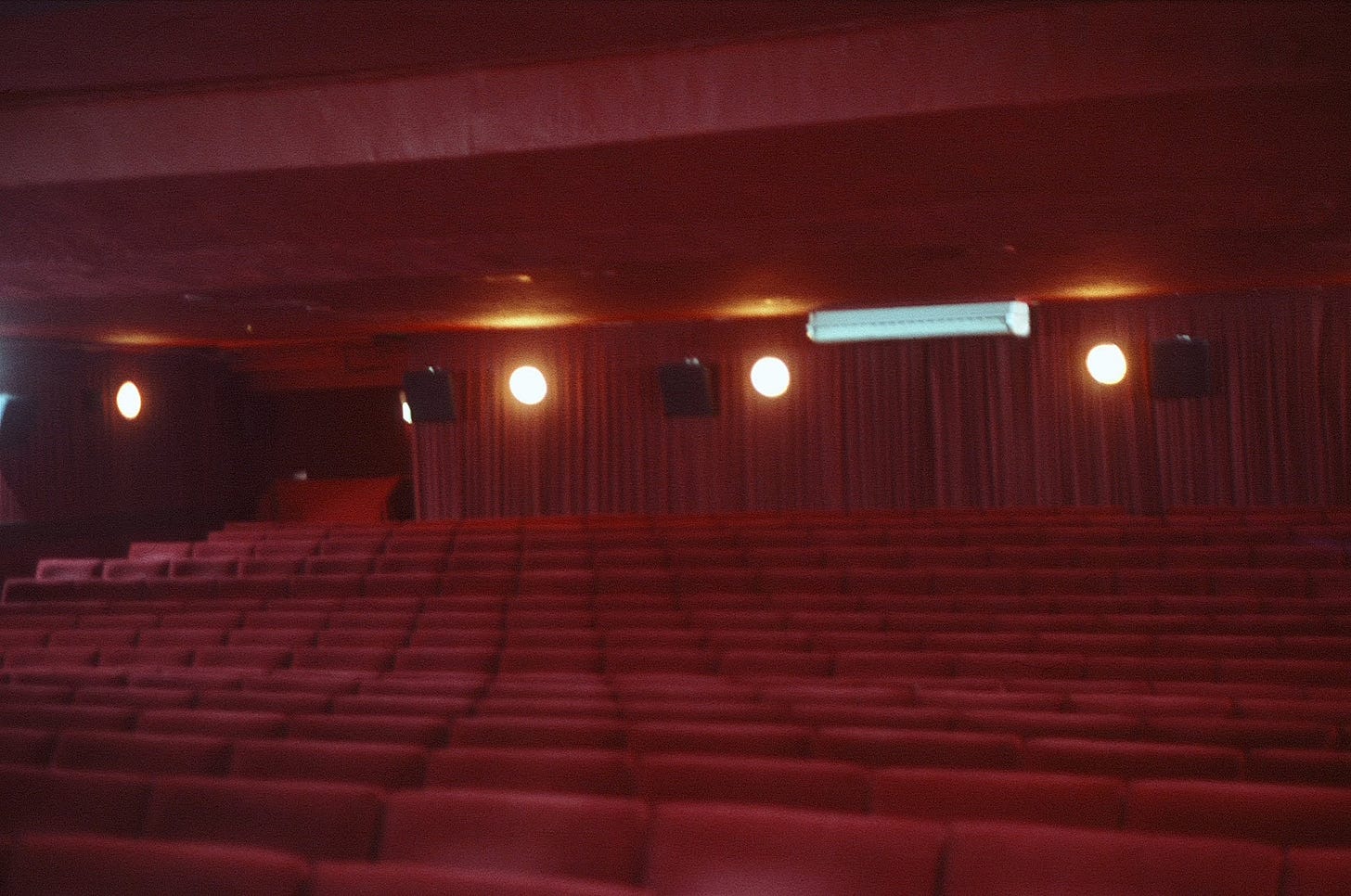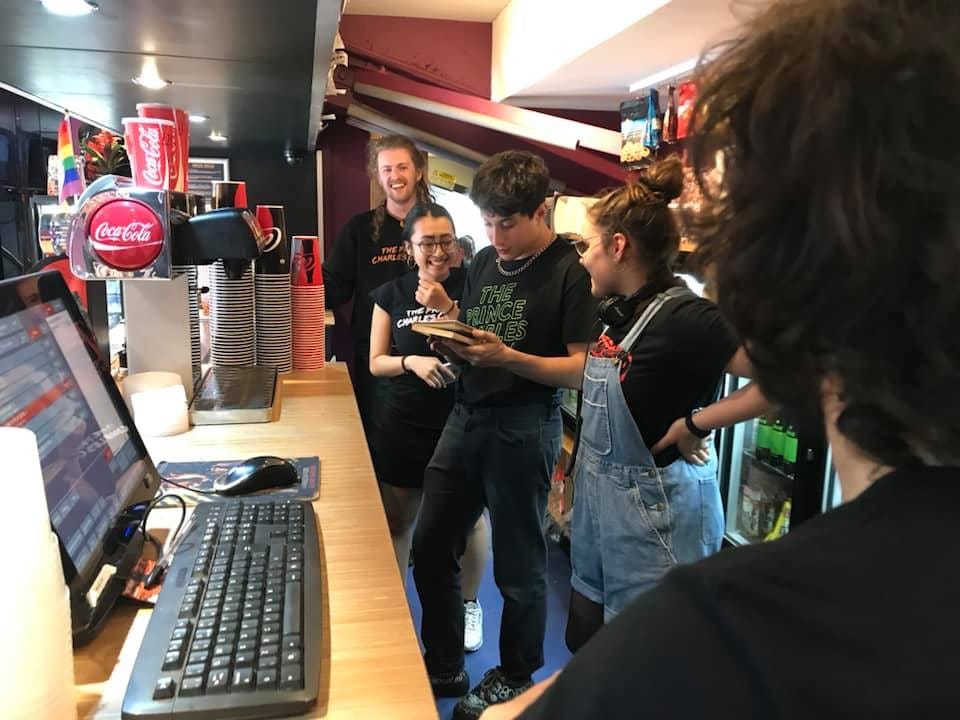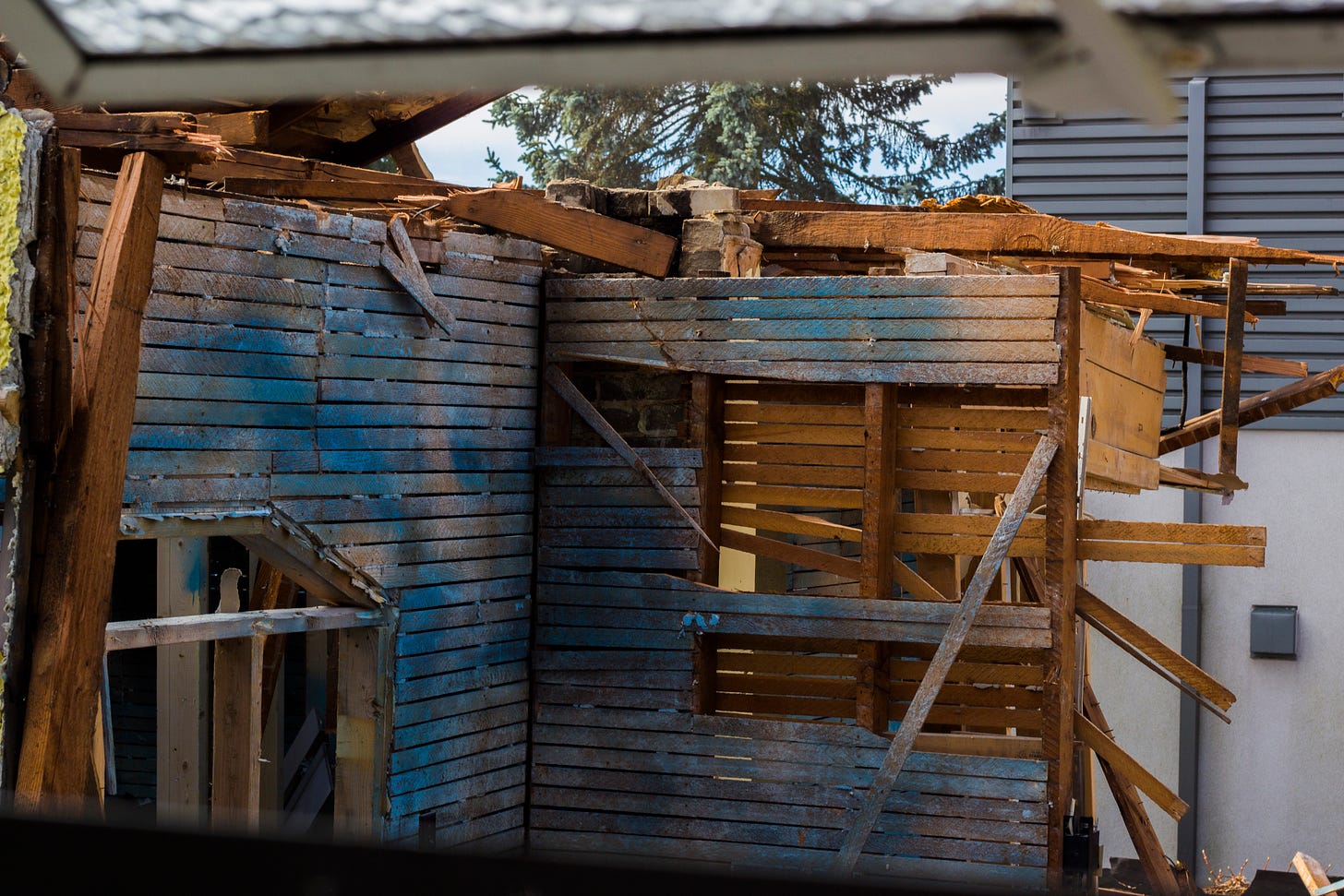#5 - Holding Space for Buildings
I’m Ariana Grande and The Prince Charles Cinema is Cynthia Erivo’s finger. No, I have not seen Wicked yet.
When my mum was a junior architect in the '90s, she had taken over a project from one of her colleagues that went on leave. She ended up finishing the build, a Toyota dealership in South Jakarta that's still standing today. I ask her a lot of questions about it when I call her because I find it fascinating that elements of an idea that used to reside in my mum's head became a physical space that exists in the world. A space that has endured her hometown's everchanging landscape.
I don't know how long that Toyota dealership will still be there for. The idea that it might not be there the next time I'm in Jakarta, or be transformed into something else entirely overwhelms me. I don't have an emotional attachment to this Toyota dealership, I've never even been inside it, but I do feel a strange kinship with it. We both came from my mother!
Mum certainly doesn't feel that same sentimentality, at least not as acutely as I do. Her current design projects are much more exciting to her than a project she worked on in her twenties. To her, it’s in the past. Her recollection of it, temporary.
It hits me like a ton of bricks when I remember that buildings aren’t permanent. The way buildings are scaled, the materials they're made out of, and the sheer amount of space they occupy feel like they should be permanent. Buildings were once empty lots and they can become empty lots again.
It's the same heaviness I feel seeing the images of rubble in Gaza, rubble that used to be someone's home, school, or favourite café. The same with all the communities in Los Angeles that have lost not only their spaces, but their possessions to raging fires. I feel it every time I see a sign for a rezoning application or a land assembly here in Vancouver, wondering if the development coming up in its place will actually become a home anyone can afford to live in.

When I heard that the Prince Charles Cinema in Leicester Square was under threat of a redevelopment clause in their new lease, my stomach dropped. I spent hours re-reading and reposting the petition (sign it if you haven't, Paul Mescal signed it—don't you want to be sexy like him?), throwing myself into the flurry of comments and outpouring love for this Central London institution that has clearly made a mark on so many lives, including mine.
I worked at the PCC as Front of House staff from 2017 to 2019, in my last few years of my undergraduate film degree. That job didn't just pay my rent or supplement my tuition in one of the most expensive cities in the world, it gave me an unparalleled film education I could not have received anywhere else. That building and the wonderful people I worked alongside (who I think about everyday and love very much and I need to be better at keeping in touch with) saw me through a massively transitional and turbulent time in my life. Being nineteen was horrible, but there were worst places to be nineteen in than a cool indie cinema!
The first film I saw at the PCC was Tommy Wiseau's The Room in 2016. I got stood up by a new friend and decided to see what all the fuss was about. The couple sitting next to me, on their second date as I learned later that evening, were also first-timers. We sat there bewildered at the roaring crowd that threw fistfuls of plastic spoons at the screen. They hollered quotes and call-and-response phrases, booed and cheered in the same breath. As an observer, it was electric. As an employee, it was just another day.

The day I dropped my CV off at the cinema, I had gone to a matinée of Headshot, the Mo Brothers' 2016 action thriller starring Iko Uwais and Chelsea Islan. I sat in the upstairs screen, watching the ceiling twinkle in darkness and digital projection light. It was such a privilege to be able to watch an Indonesian action film on a random afternoon in the middle of Leicester Square, especially when I had been feeling so homesick. Camille, a very talented illustrator/pigeon enthusiast/cool sock collector, took down my availability and sent me on my way.
I have now seen The Room more than the medically recommended amount of times anyone should ever see that film, thanks to my old job. I've opened countless Red Bulls for Tommy Wiseau. I have poured hot water into a paper cup for Tommy Wiseau and made sure he had a black Sharpie nearby to sign autographs and his name onto said paper cup so it wouldn't get thrown away. I listened to him wax poetic about his brother's (he has a brother) time working in retail. I have probably said too much now about this elusive figure, and I don't want to ruin the mystery for anyone else or risk getting sued. Jon, Fil and I had fun doing The Pod Charles Cinecast, helping me inform and refine the way I talked about movies. I was really lucky to have been entrusted with responsibilities like leading a Popstar: Never Stop Never Stopping sing-a-long or mixing White Russians whenever we were showing The Big Lebowski. I came in on my day off once under the guise of seeing 1998’s Beautiful Thing when Margot Robbie happened to be in the building. It was the best job in the world with the best people in the world.

A film that encapsulates what it was like to work at the Prince Charles Cinema is Empire Records, which follows a day in the life of young employees at an independent record store in Delaware as they face a takeover from a strict corporate chain on the same day they host a washed up 80s pop star for a signing.
We were all juggling our own lives, hopes, and dreams while spending our waking (and sometimes sleeping) hours shucking popcorn, watching movies, and keeping the place running. April 8th was a great day to be on shift, you get to draw straws to see who gets to celebrate Rex Manning Day in all its glory. The current marquee echoes Ethan Embry's iconic "Damn the man! Save the Empire!”.
All across the world, arts spaces are fighting off increasingly extortionate rents from landlords and developers that know they can flip these spaces for a higher profit. Nothing is ever enough for them. We're seeing late capitalism morph into this twisted, neofeudal hellscape where our money disappears into an already wealthy person's pockets for use of digital and physical spaces. Software used to be one-and-done purchases! We used to own physical media! I’ve recently been recommended Yanis Varoufakis' Technofeudalism: What Killed Capitalism and I am both terrified and excited to read it!
Artists used to be able to make a living making art. Writers used to be able to make a living writing, instead of frankensteining a living wage between freelance contracts. Writers used to be able to make a living writing without shitposting on Twitter (RIP) and turning themselves into commodities or influencers. We didn’t have to compete with short-form ‘content’, increasingly detached hyper-ironic meme soundbites, or the demands of advertisers or corporate stakeholders.
I'm probably just bitter that my advanced degrees aren't earning me the wages I was promised. Hell, I am bitter that my education and previous work experience aren't earning me the wages I was promised. And that the publishing industry is in shambles. And that the film industry is in shambles. And nearly every industry you can think of is in shambles or nearing shambolic velocities. And everything is expensive. And Luka Dončić got traded to the Lakers and is making more money than I will ever see in a lifetime. Who isn't these days? Ari, it's honestly your own fault that you didn't listen to your dad when he wanted you to get a mechanical engineering degree and eventually become a quant on Wall Street with that big ole 4 in IBDP Math HL you love touting so much! Why, oh, why did you ever think writing and barely doing stand-up comedy in a new city every five years would be anyway to live? (I didn't!)
Whoopsie daisies! This is supposed to be a piece about buildings! Physical structures! Commercial real estate! The decline of commercial real estate has been somewhat harrowing to watch. The fact that brick and mortar stores are becoming more difficult to sustain is scary.
My in-laws were driving me home one day and we decided to take a detour to my partner's old house. My partner was away on a meditation retreat in Alberta, so we couldn't alert him to the news that the house he had lived in throughout his last few years of university no longer exists, that something new of timber and fibreglass had come up in its place.
I managed to take some photos before my phone died to show him when he returned, and I started to worry about how he might feel. I started thinking about how I would break the news to him, that something that was a huge part of his life is just gone.
He actually took it pretty well. His retreat provided him a new, equanimous approach to the grief that arose for his place he loved, a place with so many memories attached to it. That’s the thing with places too, right? The memories we associate with them are a part of what makes them special.
He shared the following images he took of the house next door, now occupied and complete, when it was being torn down a few years ago. I was quite taken by them when he showed them to me for the first time:
What had happened to my partner’s old home and the house next door to his might someday happen to the house I live in now. My landlord might decide to sell, renovate, or move back in, then traces of this place she once knew now proliferated with the traces my roommates and I would have left behind. There's that trick of permanence again! I keep forgetting they're not meant to be permanent! But once upon a time they were!
We were socialised to aspire to property ownership, to have a place to call home where you can establish your roots, get to know your neighbours, and not have to worry about packing up your entire life and resettling somewhere temporary. I was socialised this way even though I had spend most of my childhood packing up my entire life and resettling somewhere temporary!
On a trip to Sydney two years ago, my parents had taken my brother to see the flat I had grown up in, the flat my parents shared with fellow Indonesian students in the early 2000s. The flat's still there but someone else lives inside it. My brother doesn't have all the memories or baggage my parents and I associate with that building, or the street it's on, or the Woolies that has moved a few blocks from where it used to be. That flat was never ours to begin with, but once upon a time, for a brief moment, it was.
The Kevin Smith stall in the Ladies loos at the Prince Charles Cinema was mine for five minutes when I would cry over a stupid boy or a long day at uni. I have cried a lot in that building. I've felt a lot in that building, and I'm sure I'm not the only one.
I had never seen Satoshi Kon's Perfect Blue until I worked at The Prince Charles Cinema. I got to usher it because I was the only one on shift that hadn't seen it. The film had shaken me so much, I needed a few minutes to sob quietly. Rob very kindly offered to start cleaning the screen while I took a beat inside one of our storage rooms. He radioed our manager and gave me a hug before leaving me to cry by a crate of Club-Mates. This is a kindness (not that I want's Rob bad boy reputation to be tainted in anyway) that we all extended to one another at some point as staff. Movies can get emotional! We extend the same kindness and space to each other as moviegoers in safety of a theatre’s darkness.
Corny alert! I’m very glad I’m not the kind of person that would tell anyone to “grow up” when they have a visceral, emotional reaction to a piece of art. How about you grow up and feel something!
I don't want this place to disappear. Neither do the thousands of people that have signed this petition. I just wanted to tell you how much that cinema means to me. If places and buildings have this much sentimental value to me, I imagine there are others out there who feel the same.
The verb 'build' has a heft to it, a hopeful one. It's a verb that captures how nothing can grow into something, how an empty lot can become a place or how an audience can gather to support work. Building just costs a lot more now. Buildings cost a lot more now. The material and emotional costs of building anything is just much higher than it used to be. We’ll see what happens next.
Which buildings mean a lot to you? Which places?

If you’re new here, hello! This is good in a storm, a newsletter I write for free. It used to be called Hyperfixate. I haven’t written on here in a while. I’m going to try and get some low-stakes schedule I can stick to. It took me a few weeks to finish this post because my own schedule has been throttling me lately. I haven’t been feeling motivated to do comedy so I’m going to turn this newsletter into a space for me to share a mix of writing, visual art, maybe some music, maybe some video, maybe a rant about how much I hate the usage of the word ‘content’—this newsletter is my oyster. This was a long one and lowkey preachy. Thanks for reading!
Author's note: If we went to high school together and I helped you with a group assignment and you make more money than me now, kindly redistribute your wealth to me.
Some great reads on my mind recently: the latest from Dina's Hey Fuckface, George Monbiot's essay The Self Attribution Fallacy, and Jodi Dean's Neofeudalism: The End of Capitalism? in the Los Angeles Review of Books. I also rewatched The Big Short with my partner and his mum the other night and I forgot how much it stressed me out and how hot Jeremy Strong is in that role simply because he's chewing gum and speaking in a lower register. You learn something new every day.








"No, I have not seen Wicked yet." I think you should. And maybe you're not into anime, but I recommend you watch "Dandadan". I think it's on Netflix. Cheers!